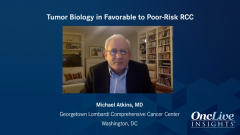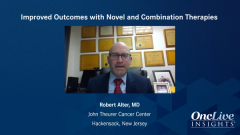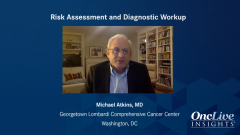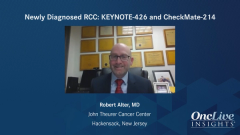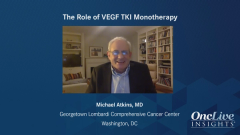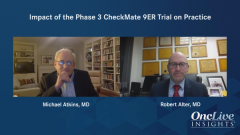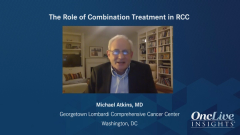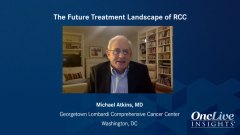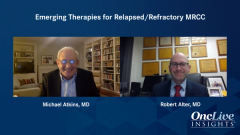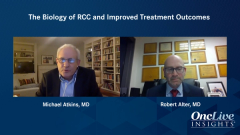
Newly Diagnosed RCC: KEYNOTE-426 and CheckMate-214
Episodes in this series

Robert Alter, MD: Let’s talk about the KEYNOTE-426 trial first. It was an open-label, phase 3 trial with an untreated clear cell renal cell patient population. The study was comparing sunitinib as the standard-of-care arm, looking at patients receiving axitinib at 5-mg dosage orally twice a day and pembrolizumab 400 mg IV [intravenous] every 3 weeks. The coprimary end points are overall survival and progression-free survival [PFS] in the intent-to-treat patient population with the secondary end point being overall response rate. The breakdown was an average of 30% patients with favorable risk and 55% patients with intermediate risk with the rest of the patients being poor risk. The data were initially presented at ASCO [American Society of Clinical Oncology Annual Meeting] in 2018.
Subsequently, they recently presented the 27-month analysis, and it still shows a clear difference with axitinib and pembrolizumab being significantly better in all end points, regardless of overall survival with the coprimary end point of progression-free survival as well as the secondary end point of overall response rate. We’re seeing a median duration of response in patients getting the axitinib- pembrolizumab being close to 24 months, patients with sunitinib being close to 16 months. For the overall survival, the hazard ratio was leaning toward a 30% or 32% improvement in patients receiving axitinib-pembrolizumab compared with those receiving Sutent [sunitinib].
We’re now starting to see CR [complete remission] in patients getting axitinib-pembrolizumab at the 27-month analysis compared with patients at the 12-month analysis. The number with axitinib-pembrolizumab was up to 9% CR compared with Sutent [sunitinib], which was 3%.
Michael Atkins, MD: That’s correct.
Robert Alter, MD: Going back to CheckMate-214, Nizar [Tannir] presented the 4-year data, which were quite impressive not just because the numbers were not only beneficial but also staying straight from years 3 through 4. This was a study looking at using ipilimumab at 3 mg/kg.
Michael Atkins, MD: It was 1 mg/kg.
Robert Alter, MD: I’m sorry, 1 mg/kg. It was then using nivolumab, which was 3 mg/kg, and that was a flat dose given in combination every 2 weeks for 4 cycles followed by maintenance nivolumab compared with sunitinib as the standard-of-care arm. With the data, I’m not even going to talk about the 2- and 3-year data. Let’s talk about the 4-year data: The progression-free survival is close to 60% or over 60% of patients receiving the combination of ipilimumab-nivolumab compared with 30% receiving sunitinib.
Michael Atkins, MD: That’s the overall survival data.
Robert Alter, MD: I’m sorry. You’re right.
Michael Atkins, MD: The PFS is 35% in patients with intermediate and poor risk as well as the overall group.
Robert Alter, MD: That’s right, but there is still an 11% CR in patients receiving ipilimumab-nivolumab, while it’s 2% in patients receiving sunitinib. There are 2 studies that have clearly knocked off the standard-of-care arm, and we’re now utilizing combination therapy of either I/O [immuno-oncology]–I/O or I/O–TKI [tyrosine kinase inhibitor], but you have to embrace the facts. Nizar presented at ASCO GU [American Society of Clinical Oncology Genitourinary Cancers Symposium], which was the last official conference when we were still allowed to see one another in public. They presented on patients who had a CR and what happened to patients who stayed on therapy, patients who came off therapy, and patients who came off because of toxicity. For these patients, 59 are still doing significantly well in durable, complete remission 4-plus years out. That is truly a testament to how we start our conversation and what our goals are: complete remission and quality of life with patients having no toxicity long term. Unfortunately, TKIs give those challenges to the patients.
Michael Atkins, MD: It does raise questions: Now that we have these 2 studies, both with significant improvement in overall survival vs sunitinib, how does one choose between those 2 regimens? Both are great regimens to have available. They certainly offer advantages over sunitinib. We don’t have any head-to-head comparisons. Even though both studies used the same control arm, there are significant differences in the patient populations enrolled in the studies, in when the trials were conducted, and therefore, in what was available for salvage treatment. Where the studies were conducted also influenced what was available for salvage treatment, which made it difficult or hazardous to compare the studies.
Furthermore, the slopes of those curves for the 2 experimental arms in those studies are different, with the nivolumab-ipilimumab arm having a typical immunotherapy slope similar to sunitinib in terms of PFS for the first 12 months, and then there was a flattening of the PFS curve after 18 months while the sunitinib curve continues to fall off. The axitinib-pembrolizumab curve has an early separation between it and the sunitinib curve, and it then runs parallel to the sunitinib curve over time. It is not yet showing a tail end on that progression-free survival curve, and it remains unclear whether it’s possible to stop axitinib and have the benefit persist. We’re going to need longer follow-up and head-to-head comparisons to know whether there’s a true immune effect to the axitinib-pembrolizumab arm, whether we see that flattening of the curve and the ability to stop treatment and the ability to not just create CRs but cure patients. That’s going to take some time.
Transcript Edited for Clarity


